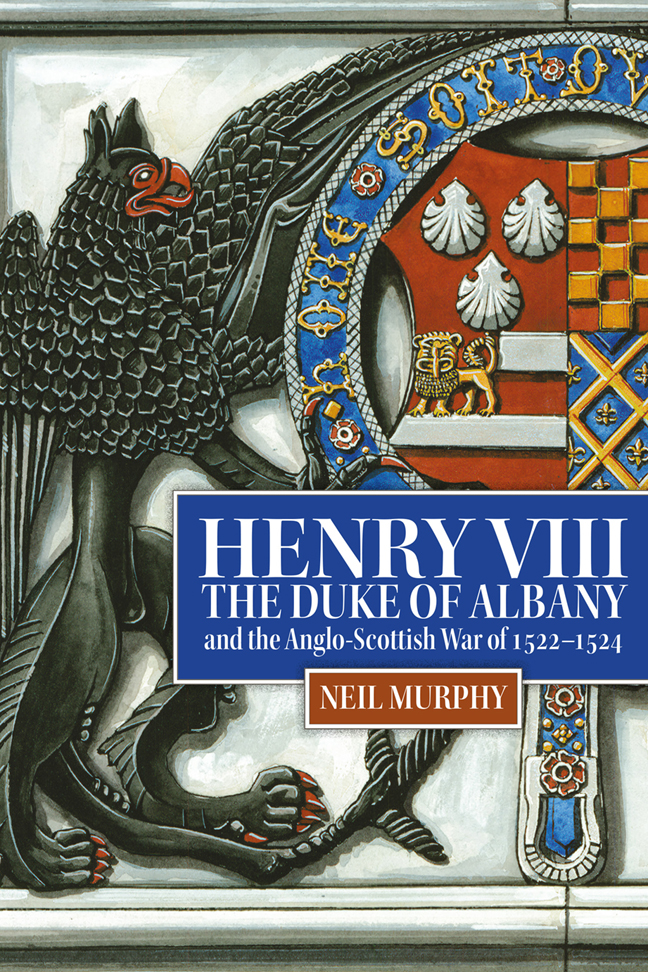Book contents
- Frontmatter
- Dedication
- Contents
- List of Maps
- Acknowledgements
- List of Abbreviations
- Glossary of Selected Scots Words and Terms
- Introduction
- 1 Albany's Return to Scotland to the Sack of Jedburgh (November 1521–September 1523)
- 2 Albany's March on Wark to the Treaty of Berwick (September 1523–January 1526)
- 3 Military Mobilisation in Scotland
- 4 The Supply of Scottish Armies
- 5 The Destruction of the Scottish Borders
- 6 The Defence of the English Frontier
- 7 Spies and Informers
- Conclusion
- Bibliography
- Index
1 - Albany's Return to Scotland to the Sack of Jedburgh (November 1521–September 1523)
Published online by Cambridge University Press: 10 January 2024
- Frontmatter
- Dedication
- Contents
- List of Maps
- Acknowledgements
- List of Abbreviations
- Glossary of Selected Scots Words and Terms
- Introduction
- 1 Albany's Return to Scotland to the Sack of Jedburgh (November 1521–September 1523)
- 2 Albany's March on Wark to the Treaty of Berwick (September 1523–January 1526)
- 3 Military Mobilisation in Scotland
- 4 The Supply of Scottish Armies
- 5 The Destruction of the Scottish Borders
- 6 The Defence of the English Frontier
- 7 Spies and Informers
- Conclusion
- Bibliography
- Index
Summary
While the return of John, duke of Albany, to Scotland in November 1521 was principally aimed at restoring political order in Scotland by asserting his authority over his key rivals, particularly the Douglases and the Humes, nonetheless it had international repercussions. It angered Henry VIII, who believed that Albany had returned both to seize the Scottish throne and to menace England's northern frontier on behalf of Francis I. For these reasons, Henry made Albany's remaining in France the cornerstone of his policy towards Scotland from 1517. He told Francis I that the maintenance of the Anglo-French peace depended on the Valois monarch preventing Albany from returning to Scotland. The 1518 treaty of London, which was designed to generate a lasting peace between the major Western European powers, included a secret clause binding Francis I to ensure that Albany remained in France. Two years later at the Field of the Cloth of Gold, Francis I reaffirmed his commitment to prevent Albany from returning to Scotland. In the months following this summit, Henry VIII continued to insist that Albany's detention in France was central to the peace – and he threatened to return to war if this agreement was not upheld.
While this understanding suited both Henry VIII and Francis I (if not the Scottish lords, who complained about the arrangement and requested Albany’s return), because they were seeking to maintain peace between their realms in the years following the treaty of London, a breakdown in relations between the Valois monarch and Emperor Charles V in 1521 destabilised the wider European peace. When Henry reaffirmed his claim that the French monarch was planning to send Albany to Scotland, Francis I, who wanted to prevent England joining Charles V in an invasion of France, stated that he would strip Albany of all his French lands should he return to Scotland. As well continuing to put diplomatic pressure on Francis to keep Albany in France, Cardinal Wolsey, chancellor of England, sought to pressure the Scottish lords to drop their calls for Albany's return by urging Henry VIII, in February 1521, to increase the size of northern garrisons and have them raid Scotland.
Yet the Tudor monarch was not ready for war with Scotland.
- Type
- Chapter
- Information
- Publisher: Boydell & BrewerPrint publication year: 2023



